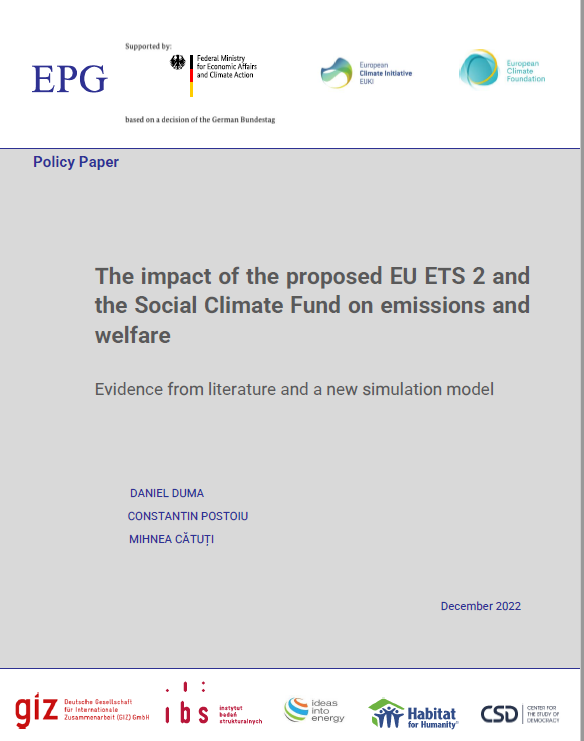Distributing the Impacts of Carbon Pricing in CEE
The project is completed. Mitigating the negative impacts of carbon pricing in Central and Eastern European countries.
Climate Policy Emissions Trading System (ETS) Energy Policy Energy Poverty

Project info
Bulgaria, Germany, Hungary, Poland, Romania
10/21 - 09/23
Non-governmental organisations, Local governments, National governments, Associations
548,055.00 €
Contact info
Constantin Postoiu
- Center for the Study of Democracy (CSD Bulgaria)
- Habitat for Humanity International Hungary Non-profit LLC (HFHI HU)
- ideas into energy gGmbH
- Institute for Structural Research (IBS), Poland
Background
Carbon pricing represents the cornerstone of the EU’s policy to combat climate change and reach carbon neutrality by 2050. While a powerful tool, it also entails a distributional effect, meaning that the benefits associated with it come with economic and social disadvantages for some EU citizens. This has led to a rather sceptical approach towards the EU’s decarbonisation process in some regions. This is also the case for Central and Eastern Europe (CEE), a region with carbon-intensive economies and populations significantly affected by energy poverty. To allow for a more uniform and progressive agenda among EU countries, decision makers have to come up with solutions that mitigate the negative impacts of carbon pricing.

Project
To come up with solutions, a thorough understanding of carbon pricing’ distributional effect of and of the interaction between climate policy and energy poverty is essential. To this end, the project team conducted a study on the effects of increasing carbon costs on economically vulnerable groups. It focused on four Eastern European EU members (Bulgaria, Hungary, Poland, and Romania) with higher-than-average fossil fuel dependence and energy poverty levels.
The study examined various aspects in which the distributional effect articulated itself, such as price responses, consumer behaviour adjustment, and labour market impacts (especially in carbon-intensive sectors).
Based on the findings, the project team made policy recommendations on how to mitigate negative effects of carbon taxation, including redistributing additional tax revenues to ensure social justice and optimise social protection for vulnerable groups. To foster an informed debate on the interaction between climate policy and energy poverty, the project team conducted public consultations on key findings with relevant decision-makers at national and EU levels. The project team coordinated its activities with the EUKI project Socially Just Carbon Pricing Policies in CEE.
Results
- The project developed a methodology and a quantitative modelling framework for analysing specific national data from official sources, focusing on the distributional impacts of carbon pricing, particularly about socially just policy scenarios.
- The project successfully published national policy papers for Bulgaria, Hungary, Poland, Germany, and Romania, interpreting the research results for their countries. The results of these national policy papers as well as the developed methodology and quantitative modelling framework were published in the final report “Distributional Impact of Carbon Pricing in Central and Eastern Europe”.
Final report:
Bulgaria:
Hungary:
Poland:
Germany:
Romania:
- For Romania this was the first study to deal with the subject of impact of carbon pricing on households and had a significant impact on policymakers. EPG members dealing with this project were invited in the Romanian Parliament to showcase the project results to an audience of 24 people. After two years of energy price increases, the deliverables of this project (publications and the events showcasing the study results) acted as good sources of information for politicians and reduced the public anxiety produced by EU’s net zero target.
Last update: July 2024







